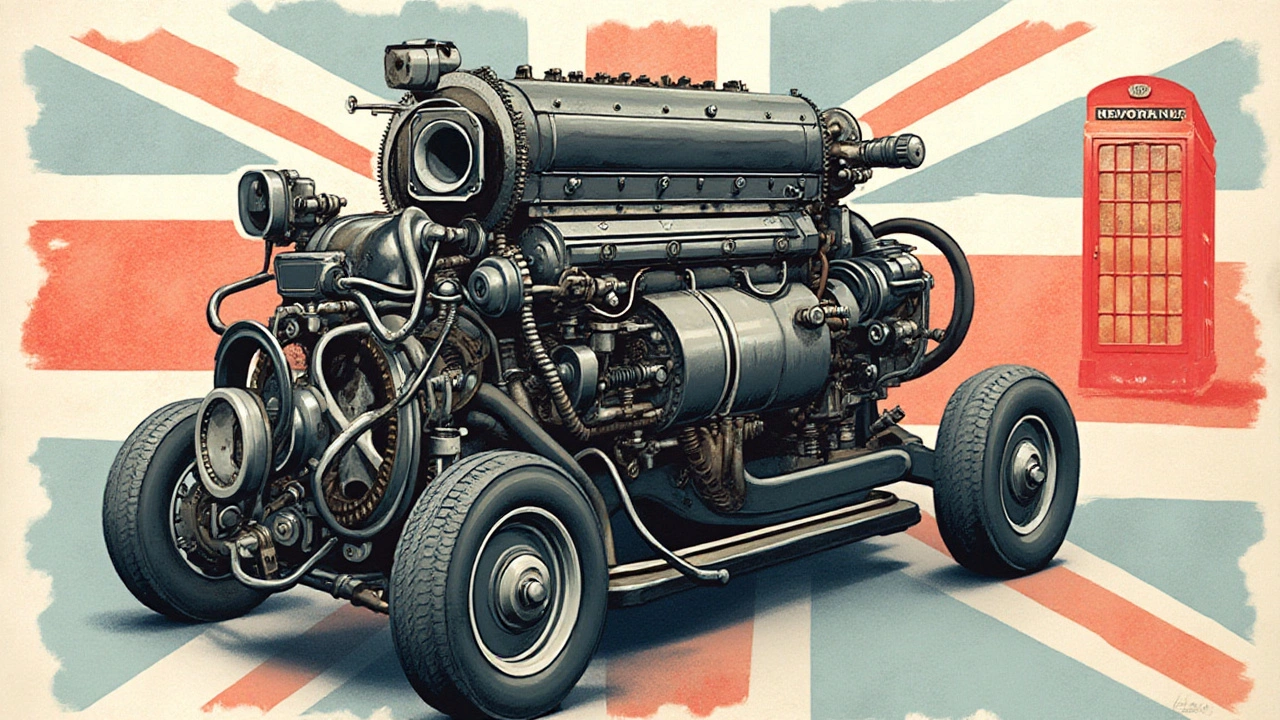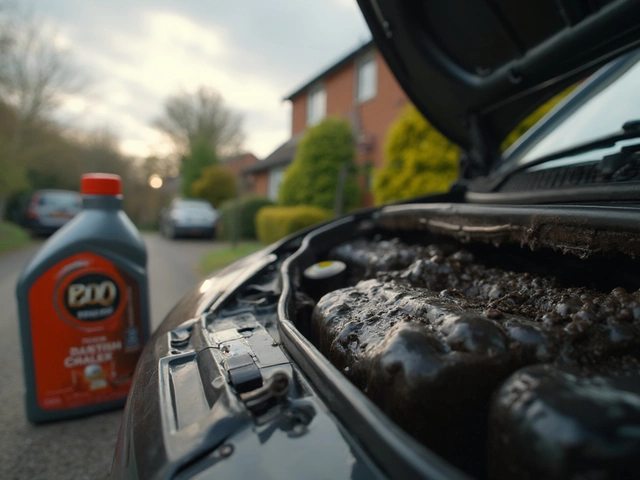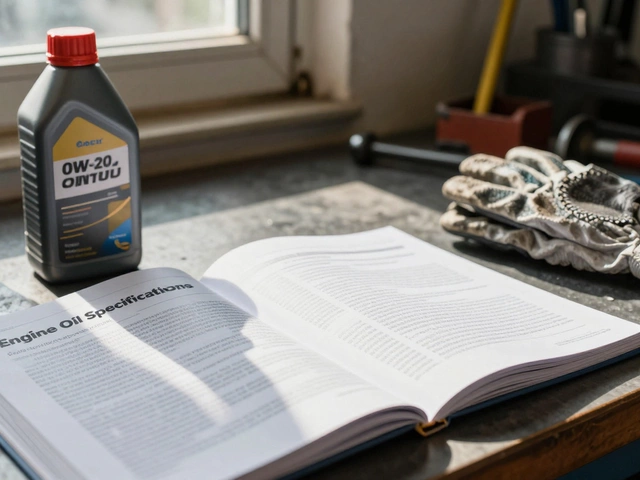Your car's engine oil is like its lifeblood, performing the critical job of lubrication that keeps all moving parts running smoothly. Yet, unlike other types of maintenance, an oil change's necessity might not be flagged by an immediate breakdown, but rather by subtle signs that often go unnoticed.
When your vehicle doesn't get its oil changed regularly, it can start exhibiting a series of warning symptoms. These include knocking noises, increased exhaust smoke, or the dreaded engine check light illuminated on your dashboard. Such signals are your car's plea for timely maintenance.
It's crucial to pay attention to these signs before they escalate into severe mechanical failures or costly repairs. Knowing what to look for and how it affects your vehicle's performance not only prevents potential damage but also ensures your car remains an efficient and trustworthy companion on the road.
- The Role of Engine Oil
- Common Symptoms of Overdue Oil Changes
- Impacts on Vehicle Performance
- Long-term Consequences of Ignoring Oil Changes
- Tips for Regular Oil Maintenance
The Role of Engine Oil
The intricate dance that occurs under the hood of your vehicle is largely facilitated by a silent star performer — the engine oil. At its core, engine oil is designed to lubricate the various parts of the engine. This essential lubrication is critical to reducing friction, which, if left unchecked, can lead to rapid wear and tear. Imagine rubbing your hands together continuously without stopping. They heat up and eventually become uncomfortable. That’s the friction in play, and similarly, engine components need that smooth glide to maintain their integrity.
The role of engine oil doesn't stop at lubrication. It also acts as a detergent in your engine. Over time, as you drive, tiny particles of metal, dirt, and grime can accumulate within the engine. These contaminants are harmful as they can block passageways and increase the strain on the moving parts. Engine oil helps in suspending these particles until the next oil change. Removing these unwelcome guests from the engine reduces the chances of them causing damage or inefficiencies. Some manufacturers have highlighted the importance of regular oil changes. A publication from the Society of Automotive Engineers pointed out, "Regular oil analysis can often pinpoint the early onset of potential engine problems, indicating when a change is necessary."
Beyond its detergent action, engine oil serves as a coolant. While your vehicle’s cooling system primarily manages engine temperature, engine oil plays a complementary role. As it circulates through the engine, it absorbs excess heat and redistributes it around the engine block, ensuring no particular part overheats. This helps in preventing engine components from warping or melting due to excessive heat, and maintains optimal performance. To better illustrate this, consider a table summarizing the roles and benefits of engine oil:
| Role | Benefit |
|---|---|
| Lubrication | Reduces friction and wear |
| Cleaning | Removes contaminants |
| Cooling | Distributes heat evenly |
Engine oil also acts like a sealant between engine components, filling in tiny gaps to prevent the escape of gases. This sealing action ensures better compression ratios in the engine, leading to improved fuel efficiency. When your engine oil is fresh and at the right levels, your car runs efficiently, consuming less fuel and reducing emissions.
Finally, understanding the types of oil suitable for your vehicle can significantly impact its performance. Modern cars might require synthetic oils for better performance, while vintage models might thrive on conventional engine oil. Selecting the right type of oil ensures the engine is primed to handle the demands placed upon it, from frigid winters to the high-performance expectations of an interstate drive. Regular checks and timely oil changes harness these benefits and allow owners to enjoy a smoother, more reliable ride.
Common Symptoms of Overdue Oil Changes
When it comes to car maintenance, the subtle hints of needing an oil change often get overshadowed by more immediate concerns. Yet, ignoring these signs can lead to a cascade of problems under the hood. One of the first symptoms you'll likely notice is unusual engine noise. As oil degrades over time, it loses its ability to lubricate effectively. Without proper lubrication, engine components grind against each other, producing a noticeable clattering or knocking sound. This noise is the engine's way of communicating distress, an indication that it’s working harder than it should to maintain its rhythm. If left unchecked, such noise can lead to significant engine damage.
Another telltale sign of neglected engine oil is an increase in exhaust smoke. All cars produce some exhaust as a byproduct of combustion, but if you notice more smoke than usual, or if the smoke has a blueish tint, it’s a sign that engine oil is burning along with your fuel. This could indicate a severe problem such as worn piston rings or seals. Smoke in these colors points to oil leaking into the fuel mixture, which not only decreases efficiency but also increases harmful emissions, putting both the car and the environment at risk.
The dashboard warning lights, specifically the engine check light, can also be indicators of overdue oil change. While this light can signal various issues, it might be alerting you to problems stemming from poor oil quality or low oil levels. The pressure in the oil system often drops when the oil level is below what the engine needs to function correctly. Regular attention to these warning signs can prevent larger mechanical issues. Moreover, the car’s performance will often drop noticeably. A neglected engine oil change can result in reduced fuel efficiency as the engine has to work overtime to achieve what it once did effortlessly.
"Regular oil changes are integral to vehicle longevity," advises David Bennett, an automotive technician with over 20 years of experience. He emphasizes that "keeping to a consistent oil replacement schedule is one of the simplest ways to ensure your car performs optimally over the long term."Persistent odors inside the cabin can also signal oil problems. You might notice a burning oil smell, which is unpleasant and a red flag. This typically means oil is burning off due to leakage, leading to potential engine damage and even fire hazards. Addressing this promptly is crucial to maintaining safety.
Owners often overlook smaller symptoms like oil quality itself. Check the dipstick, and you'll notice if the oil has turned from its golden, translucent hue to a dark, dirty black. This change in color means contaminants have accumulated, reducing the oil's ability to safeguard your engine. In the absence of regular oil changes, such debris can cause significant engine wear over time.

Impacts on Vehicle Performance
Regular oil changes are vital for your vehicle's performance. Ignoring this routine maintenance can lead to several pronounced issues that affect your car's overall functionality and efficiency. One of the most immediate impacts is the addition of friction between engine components. Without fresh, clean oil, the parts that rely on lubrication start experiencing more friction, which can lead to increased wear and tear. Over time, this enhanced friction can cause the engine to work harder, leading to decreased fuel efficiency and the potential for more severe damage.
Another significant issue resulting from untreated or old engine oil is overheating. Oil acts as a coolant in your car's engine; it absorbs the heat generated during combustion and transfers it away from critical components. When the oil becomes old and thickens due to decomposition of its additives, it loses its ability to absorb and dissipate heat effectively. This can result in higher engine temperatures, which might eventually lead to situations as dire as complete engine failure. Many car experts highlight the importance of maintaining oil regularly to prevent such outcomes. As a matter of fact, studies from auto maintenance associations suggest that timely oil changes can reduce engine wear by over 70%.
Engine performance isn't the only thing that suffers due to neglected oil changes. The vehicle might also exhibit reduced power output. You might find it difficult to accelerate or maintain speeds on highways. This happens because the engine struggles to perform optimally without proper lubrication, making the vehicle less responsive to input. With older oil, sludge buildup can occur, potentially clogging the oil filter and restricting the oil flow. This is particularly damaging as all engine components depend on a steady oil supply to function correctly.
Moreover, emissions may increase with dirty oil, making the car less environmentally friendly. Dirty oil results in carbon deposits, which can contribute to increased exhaust pollutants. This has dire implications not only for environmental impact but also for adhering to emission standards in various regions. Vehicles with poor oil maintenance often fail emissions testing, leading to costly fines and mandatory repairs. An automobile expert once noted, "Oil is like the lifeline of an engine, and compromised oil leads to compromised emissions, ultimately compromising the planet." The consistent theme here is that skipping or delaying an oil change does not just affect your car but can have broader ramifications.
Long-term neglect of vehicle maintenance like regular oil changes can often result in reduced vehicle lifespan. A car that could have easily served its owner for over a decade might start developing persistent mechanical problems just a few years down the line. The engine's internal components, if damaged due to lack of proper lubrication, might necessitate expensive repairs or part replacements much earlier than anticipated. This affects the car's resale value considerably, as new buyers are wary of vehicles that have a history of poor maintenance practices. Therefore, ensuring regular oil change not only keeps the car running smoothly but also retains its market value.
Long-term Consequences of Ignoring Oil Changes
Neglecting regular engine oil changes might seem trivial at first, yet the repercussions of such neglect can lead to significant and costly damage over time. Engine components rely on oil not just for lubrication but also to keep them cool and clean. As engine oil deteriorates or depletes, it loses its ability to perform these critical functions effectively. This neglect accelerates wear and tear on essential components, such as the camshaft and crankshaft, potentially leading to engine failure. The lack of proper lubrication creates increased friction among the moving parts, which can become disastrous when parts grind against each other, creating unwanted metal shavings and debris that contaminate the oil further.
Unchanged oil becomes thick and sludgy, drastically reducing the engine’s efficiency. It has been found that overheated oil can congeal and block oil passages, disrupting the robust flow needed to maintain engine health. Moreover, without fresh oil acting as a coolant, the engine could suffer from overheating, risking warping of metal parts and blowing the head gasket—an unfortunate event that often leads to expensive repairs or a complete engine overhaul. Car experts widely agree that debris-laden oil exacerbates the wear on seals and gaskets, which can lead to leaks and thus lower oil levels significantly without immediate notice to the driver.
"Regular oil changes are one of the most cost-effective measures you can take to prolong the life of your engine," says Michael Akers, a leading automotive engineer.
Ignoring the dire need for an oil change also affects the vehicle's overall performance. A poorly lubricated engine means increased resistance that can lead to higher fuel consumption. In today's eco-conscious world, vehicles struggling with fuel inefficiency translate to increased emissions, further straining environmental resources. The long-term financial and environmental costs are significant, emphasizing the need for timely oil maintenance. The daunting task of replacing finite parts becomes a looming shadow for car owners unwilling to make regular oil change appointments.
Moreover, neglected oil changes impact resale value. Potential buyers often hesitate to purchase cars with a spotty maintenance record, fearing underlying mechanical issues. Having regular service checks with documented oil changes reassures prospective buyers of the vehicle's condition. For the regular driver, this means preserving not only current car reliability but also potential financial returns later. Consider it an investment towards future-proofing your vehicle.
| Consequences | Impact |
|---|---|
| Increased Wear | Higher friction leading to increased part damage. |
| Engine Overheating | Overheating can warp parts, potentially leading to massive repairs. |
| Fuel Inefficiency | Poor lubrication increases resistance and fuel use. |
Maintaining a vehicle is akin to nurturing any relationship; what you put in, you get out. Ensuring regular engine oil changes enhances vehicle longevity and performance, safeguarding you from the unforeseen burdens of future hassle and cost. These proactive steps are a small price to pay for the assurance that your car remains in peak condition for years to come.

Tips for Regular Oil Maintenance
Keeping up with regular oil changes is a fundamental aspect of vehicle care, yet it's something many auto-owners frequently overlook. Start by checking your car's manual—the manufacturer often recommends a specific oil change interval, which accounts for the peculiarities of your car's build and condition. For most modern vehicles, this interval is typically between 5,000 to 7,500 miles, but older models might need attention every 3,000 miles. It’s vital to understand the specific needs of your car to keep it running at optimal performance.
One practical tip is to set reminders for your oil changes. Whether it's a sticker on your windshield or a notification in your phone’s calendar, having a visual cue can help you remember when the next oil change is due. A proactive approach prevents your car's engine oil from becoming dirty and losing its effectiveness. Regular oil checks are just as important; inspecting the oil level and clarity monthly can offer early warnings of any issues. Clear, amber-colored oil indicates good condition, while dark, grainy oil means it's time for a fresh pour.
“The oil is the most overlooked fluid in a vehicle, yet it's the lifeblood of any engine,” says renowned mechanic and automotive expert, John Marcus.
Another vital tip is choosing the right oil. Not all engine oils are created equal; they come in different viscosities and formulations suited for different cars and climates. Whether you opt for synthetic or conventional oil should be dictated by factors such as climate, driving habits, and your vehicle’s age. Synthetic oil offers better performance in extreme temperatures and has a longer lifespan but may come at a higher price point. Maintaining the right level and type of engine oil ensures your vehicle remains efficient and reduces the chance of unexpected engine issues.
Finally, consider your driving conditions. Frequent short trips, stop-and-go traffic, and harsh weather can increase engine stress, meaning you may need more frequent oil changes. Regular trips to your local mechanic for general vehicle check-ups can catch potential problems before they become serious. Investing in regular vehicle maintenance may seem tedious, but it pays off in longer vehicle lifespan and less frequent repairs in the future.


